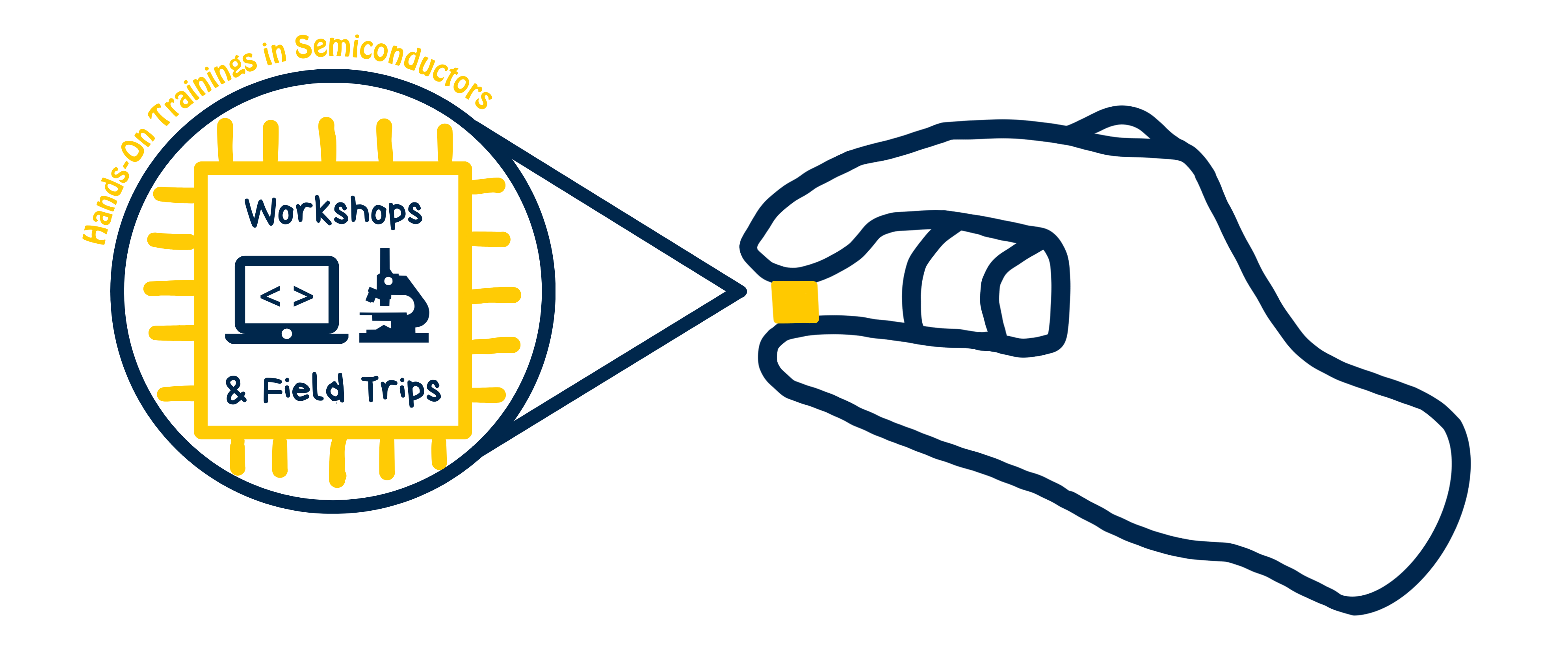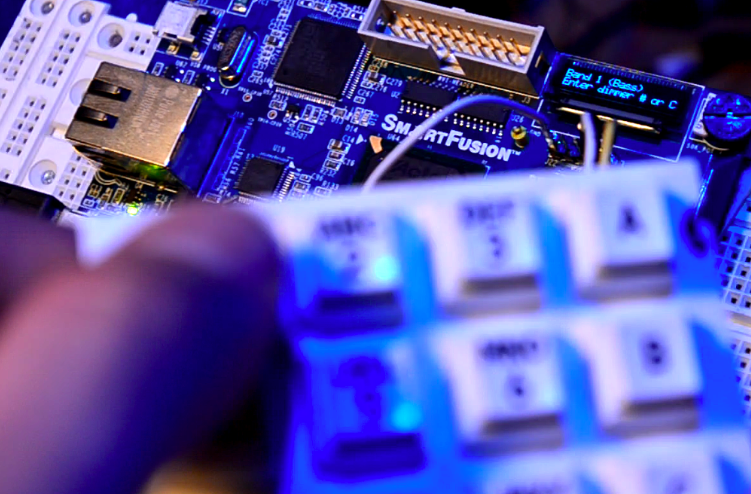
The Hands-On Trainings In Semiconductors is an immersive, hands-on training initiative designed to ignite interest and deepen understanding of microelectronics and semiconductors. Open to high school and community college students, this program provides a unique opportunity to explore the fascinating world of semiconductor technology and its applications.
Participants will take part in a fun and engaging training program where they’ll learn about topics like how computer chips are made and how we measure and test them. Each session includes hands-on activities, so students can learn by doing and working with others.
The program uses cutting-edge labs and tools at the University of Michigan, like a chip-making lab, a lab for testing materials, and coding tools like Arduino. Students only need basic knowledge of math and science to participate.
At the end of the program, students will earn a certificate to show what they’ve learned. These certificates can be added to a portfolio to help with future opportunities in science and technology.
Encourage your students to join this exciting program to explore the world of semiconductors, gain hands-on experience, and work on projects that could shape the future of technology!
“I loved the experience, and thought it was really cool to see the different technology we have, as well as getting to see where I might be in the future!”
HOTIS Alumna
What Are Semiconductors?
Semiconductors are components of electronic devices. They are also called microchips or integrated circuits (ICs).

Why should I care about semiconductors?
You’re using them right now!
No matter what kind of device you are using to read this, it works because of the semiconductors used to create it.

Mostly, sand!
Semiconductors are made from “pure elements” (which means they’re made of just one kind of atom) or compounds. The most common elements used are silicon and germanium. Since sand has a lot of silicon—between 35% to 52%—it’s a cheap and easy material to use for making semiconductors

Short answer: very carefully.
Semiconductor companies follow a complex process involving many stages of design and manufacturing to perfect semiconductor production. Fabrication labs, also known as “fabs,” use ultra-clean environments and precision equipment to craft tiny, powerful chips. This involves steps like photolithography, etching, doping, and packaging to ensure the chips perform reliably.
Sign up below to learn more about…
- how semiconductors are used in systems,
- what semiconductors are made of, or
- how semiconductors are made.
TRAININGS
Introduction to Metrology
Join our workshop to uncover the mysteries of semiconductor materials! You’ll use tools like electron microscopes to investigate just what electrical components are made of, as well as experimenting with just how we get electricity to flow where we want it. This workshop includes fun demonstrations and lots of hands-on activities.
Digital Design
if (interests.include(“soldering circuits”) && interests.include(“programming projects”)) {
enrollIn(“Embedded Systems Training”);
}
Explore the basics of hardware design and software creation in this course. Code a RaspberryPi, solder components onto a PCB to create a game, and learn what exactly is inside of a desktop computer.
AI + Machine Learning
New!
This exciting workshop builds on Digital Design and brings computers to life. Students will dive into the world of artificial intelligence, exploring how machines learn and make decisions. It’s the only Edge AI workshop currently available to Michigan high schoolers, and it’s full of hands-on activities. Students will use Google’s Teachable Machine and even build and program their own simple AI models.
FAQs
HOTIS will be held on the University of Michigan campus in Ann Arbor during the academic school year. We also are piloting a new program where we
Throughout the day, students will be guided by UM student leaders to various instructional settings and labs around U-M’s North Campus.
When booked through your school or academically-aligned organization, HOTIS is absolutely free. All we ask is that you provide your own transportation and meals — we’ve got the rest covered!
Your students are eligible to attend a HOTIS session if:
– They are in 9th, 10th, 11th, or 12th grade, or if they are enrolled in a community college degree or certificate program.
– They have an interest in science, mathematics, or engineering.
– They want to learn about opportunities in the microelectronics field.
We welcome participants of any identity. Only basic high school-level experience in science or engineering is necessary. Come curious and ready for fun!
All applicants will receive an email within a week of application submission to let them know if they have been accepted to the requested session. Applications are reviewed on a rolling basis.
Please do not send money with your application. Accepted students will be asked to send a non-refundable tuition payment of $25 at least three days before the first day of training. Instructions for payment will be included in the acceptance email. If you have circumstances that require delaying payment, please email maveric-info@umich.edu.
Yes! Need-based scholarships are available. If financial aid is required, select “Yes” for the question “Do you experience financial hardship in paying the registration fee?” in Section 3 of the application. Accepted participants will be contacted to fill out a need-based scholarship form as soon as they are admitted to the training session.
If you are unable to attend camp, we unfortunately cannot offer a refund for giving up your place in the program. If you have special circumstances, please email maveric-info@umich.edu.
To ensure the best experience for all participants, we require a minimum of 10 students for each class to proceed. Registration closes the Friday before the session begins.
If MAVERIC is forced to cancel programming due to insufficient enrollment, a public health concern, or weather-related issues, you will receive an offer to reschedule your session.
For More Information or Questions, Please Contact:
Emily Johnson
ejbook@umich.edu
MAVERIC – Project Manager
Michigan Advanced Vision for Education and Research In Integrated Circuits
University of Michigan